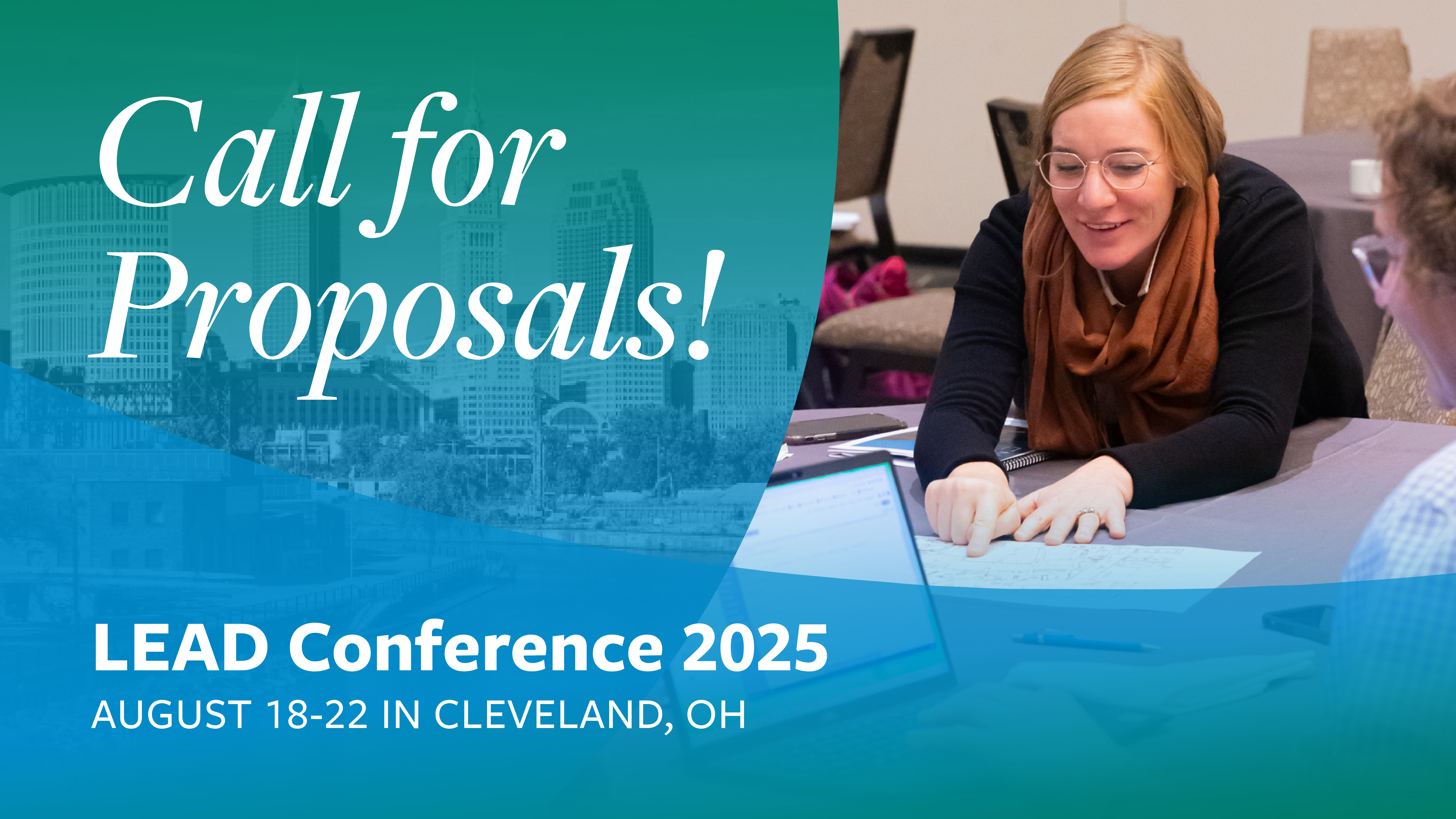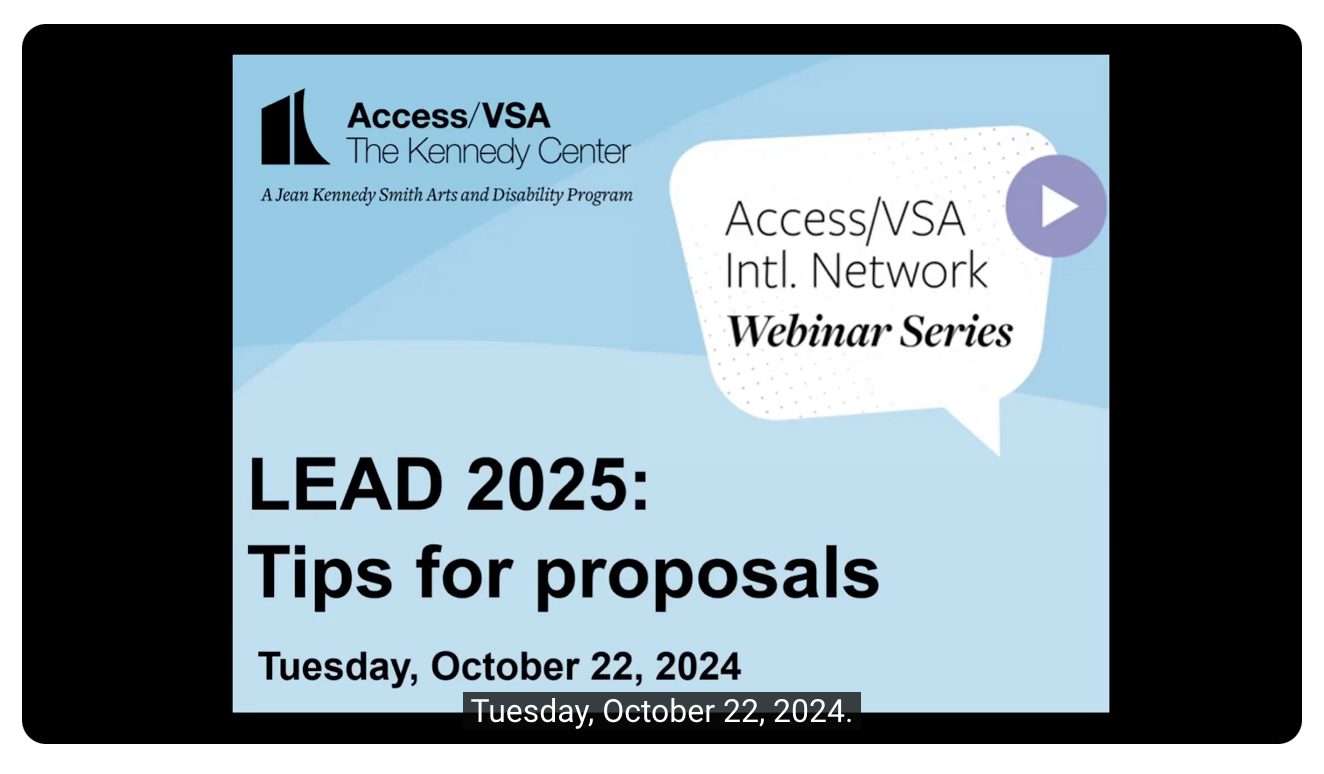2025 LEAD Conference Tips for Session Proposals
About the Call for Proposals
The Kennedy Center's Office of Accessibility is seeking proposals for the 2025 LEAD® Conference that approach accessibility from a human and civil rights perspective; provide practical information addressing current trends and opportunities in this field; actively engage participants through discussion and/or hands-on activities; explore accessibility for a variety of cultural arts organizations, including performing arts centers, museums, theaters, state arts agencies, parks, zoos, and arenas; and are designed for new, mid-career, and/or seasoned professionals.
Deadline: Proposals must be submitted by December 2, 2024, at 11:59 PM Eastern. Apply now!
If you have a session idea that addresses the intersecting fields of general education, arts education, special education, and teaching artistry, please visit the ED@LEAD call for proposals page.
If you have any questions, would like to request proposal materials in a different format, or to discuss your proposal, please contact the Kennedy Center's Office of Accessibility at 202-416-8727 or [email protected].
Tips for Proposals Webinar Recording
Watch the Tips for Proposals Webinar from Tuesday, October 22, 2024, hosted by the Kennedy Center's LEAD team in the Office of Accessibility.
Frequently Asked Questions
Q. I want to present a session about general education, arts education, special education, or teaching artistry. Is this the right place to propose this type of session?
A. No. Our ED@LEAD component on Monday, August 18 is going to be a better fit for your content and the audience attending! Head here to learn more about education focused proposals.
Q: Is there a limit to the number of proposals you can submit?
A: Yes. You can submit up to 3 different proposals.
Q: What topics are you hoping to get proposals on? Do you have a sense of what people are looking for specifically this year?
A:
- Representation, equity and intersectionality.
- Putting the 'A' in DEIA.
- Space for connection – an opportunity to talk, discuss, and share with others doing this work.
- Employment of people with disabilities
- Inclusion in various environments – in-person, virtual, and hybrid.
- Self-Care and Capacity - so many people are now working with reduced teams or doing the work done previously by multiple staff members.
- Sustainability - ensuring access programs continue during times of staff transition.
- Inclusion of people with invisible disabilities
- Everything and anything related to funding
- Pragmatic approaches to implementing access plans
- Creative aging approaches, strategies and inclusion
- Inclusive education practice in community settings
Q: What topics or sessions are already being curated and planned by the LEAD team?
A: There are several session types and session topics that the LEAD Team are curating for the 2025 conference. We are NOT seeking proposals for the following:
- Capacity Building Workshops: These are 4–8-hour intensive workshops that focus on a specific topic. These will take place on Tuesday, August 19, 2025.
- Foundations of Access: These sessions are our introductory accessibility track and are meant for beginners. The topics included are:
- Accessibility in Cultural Organizations
- Introduction to Accessibility Laws
- The Built Environment
- Blind and Low Vision Access
- Deaf and Hard of Hearing Access
- Neurodiversity
- Web and Digital Accessibility
- Strategies for Planning, Prioritizing and Implementing
Q: What will reviewers be looking for in session proposals?
A:
- Representation. Direct or indirect representation from the communities of people with disabilities is essential.
- Practical Information presented in a way that can be adapted to other settings. Sessions should focus on the "how" and "why" of the topic work rather than a simple case study of "what" they did.
- Engagement. Our participants want to have the opportunity to discuss or practice what they are learning to understand how it can be adapted for their own organization.
- Alignment. Sessions that achieve what is outlined in their description.
Q: Is it OK to list some speakers as "To Be Announced" if we don’t have everyone confirmed?
A: Yes, as long as there's one person on the proposal who will be part of that session. There's going to be flexibility built into this process. We know that, unfortunately, people may plan on coming or working with a colleague and then something might change that. Sometimes people reach out because they would like to have additional perspectives, and have asked if we can help connect them. We're happy to do so!
Q: Who comes to LEAD?
A: LEAD® provides professional development for staff people working in the cultural arts organizations - most often in roles such as:
- Accessibility Managers and Coordinators
- Box Office and House Managers
- Outreach and Education Coordinators
- Managers of Studio and Performing arts programs housed in cultural institutions
- Patrons and Visitor Services Managers
- Facilities and Operations Managers
- Exhibition Designers
- State and Local Government ADA/504 Coordinators
- Marketing and Audience Development Directors
- State Arts Commission/Council Accessibility Coordinators
More information about LEAD is available on our FAQ page.
Q: Are the people that come to the conference already practicing in this space or are they interested in beginning that practice?
A: All of the above! The whole premise of the LEAD Conference is to move accessibility in the cultural sector forward. It’s very much about sharing information, sharing tips, asking questions and getting feedback. There are people who come to the LEAD Conference who have been tapped with doing this in their organization or who take it on themselves because they see a real need for it. Some are starting from scratch and others have been coming to the LEAD Conference for years or have a lot of experience in this work. They may work as ADA coordinators, or some other area related to accessibility or they're just very committed to it.
It’s also important to recognize that there are always things to learn and often, there are multiple approaches rather than one "right" answer.
Q: Is there a place on the proposal form to indicate who you are gearing your presentation to? For example, is this a session for beginners?
A: Yes. There is a place to indicate the audience you are thinking about, including their experience with the topic as well as the kind of organization they work in.
Q: What should I do if I’m not sure which format will work best? Should I submit my proposal in multiple categories?
A: There's no need to submit the same proposal in multiple categories. If the reviewing team thinks it's a great proposal but it might work better in a different format, someone would get back to you to discuss. Also, if your proposal is accepted and sometime between then and the conference, you want to change the format, we’re happy to talk with you about that.
We do want to emphasize how important it is to think about a diverse audience of learners and how you plan to engage everyone. The interactive piece is critical no matter which format you choose. Having a handson interactive piece or different ways of engaging the people who are in your session is a more inclusive approach in general.
Q: Can my proposal be a case study?
A: If the case study presents information or resources in a way that can be easily used by cultural institutions, then yes. The transferable information should be at the center of the presentation, rather than high levels of detail about the study itself. Consider focusing on the process - the "how" and "why." Where were the decision points, what was considered, and why decisions were made.
Q: We would like to submit a proposal but are worried that not enough people will attend. We are a small organization. How can we make our proposal appeal to a broader audience?
A: There are multiple options here. You could reach out to other types and sizes of organizations who may be able to speak to your topic and see if they can join you in a panel. You could also look at your proposal and create opportunities for people to engage in a way that allows them to scale up, or adapt the information you are presenting for their own situation.
Q: Do I have to include information about the ADA in my proposal?
A: Not at all. The majority of content at LEAD doesn't focus on compliance - it's about best and better practices. However, if your proposed session assumes that attendees already have met and understand basic accessibility requirements, that would be worth including as a part of your proposal.
Q: I have an idea for a panel, but need some help with suggestions for some of the panelists. Is that something LEAD staff can help with?
A: Yes, we would be happy to connect you with others in the field. Contact us at [email protected] or 202-416-8727.
Q: I am interested in proposing a 15-minute Lightning Talk. Do I need to fine other people interested in presenting other 15-minute Lighting Talks to fill the full 75-minute concurrent time slot?
A: No, the LEAD Team will do the work of grouping the selected Lightning Talks to fill the concurrent time slots.
Q: Can I submit a proposal and apply to be part of the proposal reading and selecting process?
A: Absolutely! If selected, our team will assign proposals to reviewers to avoid conflicts of interest. The application to apply to be a LEAD 2025 Content Committee: Proposal Reviewer is now open until November 25, 2025.
Still have questions? Contact our team at 202-416-8727 or [email protected]!


